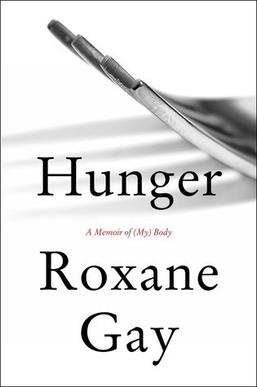Hunger: A Memoir of (My) Body
Hunger: A Memoir of (My) Body is a deeply personal and powerful work by Roxane Gay, an American writer, professor, editor, and social commentator. Published in 2017, the memoir explores the complex realities of obesity, body image, trauma, and the journey towards self-acceptance. Through her candid narrative, Gay delves into the ways in which her body has been a source of conflict and conversation, both privately and in the public eye.
Synopsis[edit | edit source]
Hunger: A Memoir of (My) Body recounts Roxane Gay's experiences with her body, starting from her childhood to her adult life. The memoir is structured around the understanding and acceptance of her physical self in a world that often has narrow and punishing views on what bodies should look like. Gay discusses the traumatic event of being raped at the age of 12 and how this violence led her to see her body as a fortress, subsequently leading to her struggle with obesity. The book is not only a personal narrative but also a critique of societal norms and expectations regarding body size, beauty standards, and health.
Themes[edit | edit source]
The memoir touches on several significant themes such as:
- Body Image and Self-Perception: Gay's narrative provides insight into the struggles with body image and the impact of societal pressures on self-perception.
- Trauma and Recovery: The memoir is a poignant exploration of the long-lasting effects of trauma and the complex journey towards healing.
- Feminism and Intersectionality: Gay examines the intersections of gender, race, and body size, highlighting the compounded discrimination faced by individuals at these intersections.
- Cultural Criticism: The book also serves as a critique of cultural attitudes towards obesity, beauty standards, and the moral judgments often associated with body size.
Reception[edit | edit source]
Hunger: A Memoir of (My) Body received widespread critical acclaim for its honesty, bravery, and eloquence. Critics and readers alike praised Gay's ability to articulate the challenges of navigating a world that is often hostile to bodies that deviate from a narrow standard of beauty. The memoir has been recognized as an important contribution to discussions about body positivity, self-acceptance, and the need for a more inclusive understanding of health and beauty.
Impact[edit | edit source]
Roxane Gay's memoir has had a significant impact on conversations about body image, contributing to a broader dialogue about the diversity of bodies and the importance of accepting and celebrating this diversity. It has also been a source of comfort and validation for many who have felt marginalized because of their bodies. The book has been used in educational settings to discuss themes of body image, trauma, and recovery.
See Also[edit | edit source]
Search WikiMD
Ad.Tired of being Overweight? Try W8MD's physician weight loss program.
Semaglutide (Ozempic / Wegovy and Tirzepatide (Mounjaro / Zepbound) available.
Advertise on WikiMD
|
WikiMD's Wellness Encyclopedia |
| Let Food Be Thy Medicine Medicine Thy Food - Hippocrates |
Translate this page: - East Asian
中文,
日本,
한국어,
South Asian
हिन्दी,
தமிழ்,
తెలుగు,
Urdu,
ಕನ್ನಡ,
Southeast Asian
Indonesian,
Vietnamese,
Thai,
မြန်မာဘာသာ,
বাংলা
European
español,
Deutsch,
français,
Greek,
português do Brasil,
polski,
română,
русский,
Nederlands,
norsk,
svenska,
suomi,
Italian
Middle Eastern & African
عربى,
Turkish,
Persian,
Hebrew,
Afrikaans,
isiZulu,
Kiswahili,
Other
Bulgarian,
Hungarian,
Czech,
Swedish,
മലയാളം,
मराठी,
ਪੰਜਾਬੀ,
ગુજરાતી,
Portuguese,
Ukrainian
Medical Disclaimer: WikiMD is not a substitute for professional medical advice. The information on WikiMD is provided as an information resource only, may be incorrect, outdated or misleading, and is not to be used or relied on for any diagnostic or treatment purposes. Please consult your health care provider before making any healthcare decisions or for guidance about a specific medical condition. WikiMD expressly disclaims responsibility, and shall have no liability, for any damages, loss, injury, or liability whatsoever suffered as a result of your reliance on the information contained in this site. By visiting this site you agree to the foregoing terms and conditions, which may from time to time be changed or supplemented by WikiMD. If you do not agree to the foregoing terms and conditions, you should not enter or use this site. See full disclaimer.
Credits:Most images are courtesy of Wikimedia commons, and templates Wikipedia, licensed under CC BY SA or similar.
Contributors: Prab R. Tumpati, MD

